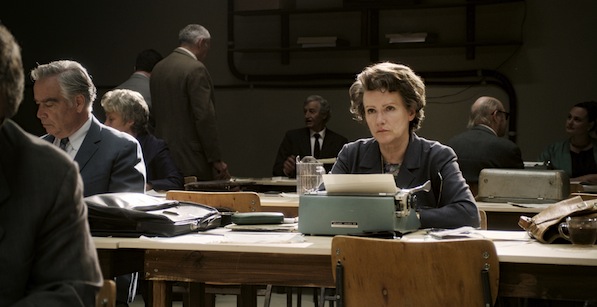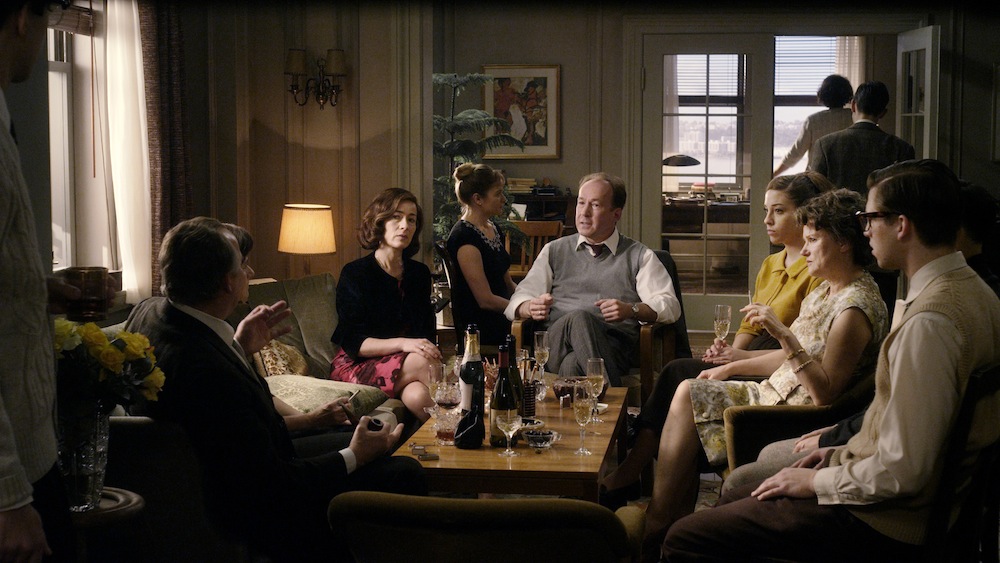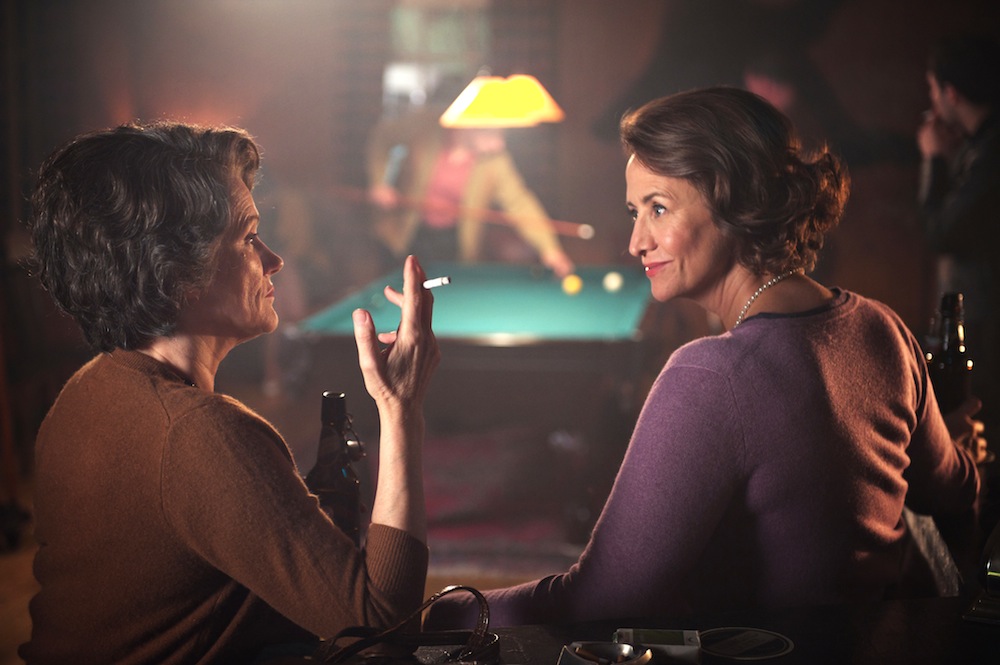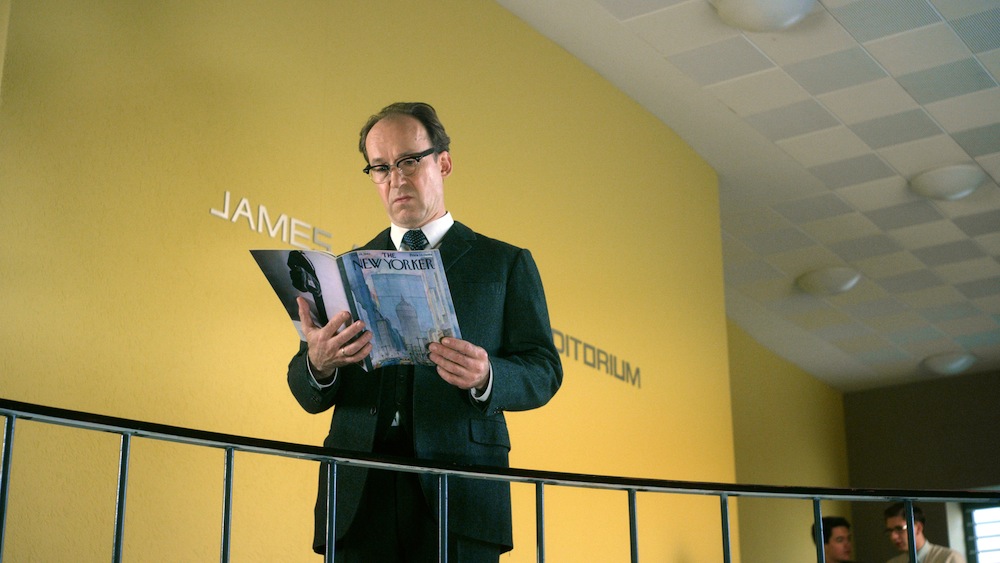Arriving at a moment when the better part of the motion picture industry is in a mad race to the bottom, “dumbing down” its product as much as it possibly can the better to make the likes of Iron Man 3 rule supreme, Margarethe von Trotta’s Hannah Arendt is wondrous strange. It’s not simply an intelligent piece of filmmaking—it’s a film about intelligence itself. A fortiori it centers on the moral imperative of thought. For its heroine, a political theorist and scholar is shown at the apex of her fame and infamy when she elected to cover the war crimes trial of a brutal Nazi commandant and produce a study, Eichmann in Jerusalem: A Report on the Banality of Evil (1963), that as its subtitle clearly indicates finds that the most monstrous of deeds can be committed by the most ordinary of men. Her book disappointed those expecting a full press portrait of Eichmann with horns and a tail. Worse, it enraged countless others for mentioning the complicity of several Jewish leaders in the events that have come to be known as The Holocaust. Lost in the controversy, but strongly underscored by Von Trotta and her script collaborator Pam Katz is Arendt’s insistence that thought is inseparable from good and a disinclination to think, inextricably tied to evil.
Dealing as it does with Nazism, a court trial that captures the world’s attention and a female intellectual with no compunction about moving against the grain of the status quo, the dramatic possibilities of this project are obvious. But von Trotta, who began her career as an actress for Rainer Werner Fassinder (The American Soldier, Beware of a Holy Whore) before becoming a filmmaker herself with The Lost Honor of Katharina Blum (co-directed with her then husband Volker Schlöndorff in 1975) followed by such noteworthy works as Marianne and Julianne (1981) Rosa Luxembourg (1986) and Rosenstrasse (2003) is a subtle and canny cinematic artist. For Hannah Arendt begins as if it were a conventional thriller, only to subvert expectations, setting sail on as yet uncharted dramatic waters of intellectual resolve.
The film begins with a bus depositing man whose face we do not see along a deserted road at night. A truck drives up and its occupants grab the man and stuff him inside. We eventually learn that what we’ve just witnessed is a recreation of the 1960 kidnapping of Adolph Eichmann by the Israeli secret police who had tracked him down in Argentina, where he has fled thanks to false passports provided by the Vatican. But rather than move from this scene to another that’s equally dramatic as most thrillers would do, von Trotta takes us to a Manhattan apartment where an attractive, casually dressed middle-aged woman pensively puffs a cigarette. It’s Hannah Arendt thinking. And we’ll see a great many similar shots in the action that follows. Thanks to the uncanny intensity of Barbara Sukowa’s performance this isn’t off-putting at all. The more we see of Hannah thinking the more we long to know what’s on her mind. And von Trotta doesn’t offer easy answers.
We’re then introduced to the world in which Arendt resides. She has a loving husband (Axel Milberg), friends like writer Mary McCarthy (Janet McTeer), a sympathetic and loyal secretary (Julia Jentsch), and scores of admiring students and colleagues. But behind this is a more unsettling picture first revealed in flashback when as a student at the University of Marburg she learns that her professor, noted philosopher Martin Heidegger (Klaus Pohl)—who was also her lover at the time—had been a supporter of the Nazi party when he was rector at the University of Freiberg. Further flashbacks that appear as action set in the “present” of the early sixties continues to unfold show her rejection of Heidegger as a romantic and professional partner. Yet he’s not out of the picture entirely. Far from it.
That von Trotta chose to dramatize Arendt’s relationship with Heidegger rather than what she faced at the hands of the Nazis (we are simply told of her imprisonment at Camp Gurs and escape to the U.S. with help from anti-Nazi forces) highlights “the personal is political” in a very special way. For when Arendt approaches The New Yorker magazine with a proposal of covering Eichmann’s trial it’s clear she not only has Heidegger in mind, she’s imagining him in the dock. For in flashback strategically placed in the last part of the film we see Heidegger lecture to his students that “Thinking does not endow knowledge” and “Thinking does not endow us with the power to act,” we’ve already been shown that the opposite is true. In a great coup de theatre, von Trotta shows us excerpts from the Eichmann trial. Beautifully preserved black-and-white footage discloses the real Adolph Eichmann, claiming to the court that we was merely “following orders” in shipping thousands of Jews to the extermination camps, that he never killed any of them himself, and even that he’s not an anti-Semite. Sporting a prissy-mouthed sneer, he declares “I am a rump steak being grilled.”
Arendt is ever so briefly astonished by this. “He’s not spooky at all,” she tells her friends and colleagues. “He’s a nobody.” When Eichmann goes on to say “One could call it a state of being split”—meaning the distance between his feelings and the actions he undertakes—the argument that Arendt will eventually advance begins to take shape in her mind. Because of what she sees as the disparity between “the unspeakable nature of the deeds and the mediocrity of the man,” why not take Eichmann at his word? For in “just following orders” he shows that the most horrendous of crimes can be committed by the most unremarkable of people if they forego thinking about what they’re doing. In other words his lack of moral awareness makes him more of a monster than the conventional killer so many imagined him to be. Moreover this is the exact opposite of Heidegger’s teachings. Because Eichmann “didn’t think” evil deeds naturally followed.
This was a quite breakthrough for a writer who had already dazzled the intellectual world with The Origins of Totalitarianism (1951) and The Human Condition (1958), studies that condemned crimes of both the right (Hitler) and the left (Stalin) with equal fervor. Moreover as she was doing this new work for The New Yorker she was reaching an enormous audience most of whom weren’t familiar with her previous books. But as von Trotta shows, there was little time to celebrate thanks to the firestorm of controversy Eichmann in Jerusalem created. New Yorker editor William Shawn faces a tsunami of telephoned threats. Old friends like the ailing Kurt Blumenfeld (Michael Degan) literally turn their back on Arendt, claiming on the basis of press reports (some of them don’t even read the entire manuscript) that she has come to sympathize with Eichmann. Making matters worse are the passages in Eichmann in Jerusalem about the complicity of some Jewish leaders with the Nazis which while true, and very much a part of the trial prove too much to bear. With her position at the university now in jeopardy Arendt faces her critics in a speech explaining her work more thoroughly than ever. But even it’s isn’t enough to placate Hans Jonas (Ulrich Noethen), a friend and colleague who had once been in love with her. “As of today I am finished with Heidegger’s favorite student ,” he declares as he leaves the lecture hall.
Clearly Von Trotta is on Arendt’s side in all of this. Yet her film isn’t hagiographic. We’re left considerable room to wonder why she didn’t anticipate the uproar, or that her declarations that her notations of the complicity of certain Jewish leaders were simply “the truth” requiring no further explication. There’s more than a trace of arrogance in her insistence that her views are easily comprehended and therefore digestible. She’s a warm and wonderful person to her friends. And there’s admirable resolve in her insistence that the Holocaust wasn’t just committed against the Jewish people but was “a crime against humanity.” The purpose of the camps, she explains, was to convince the Jews that they “were nothing” and therefore expendable—not “human” at all. “I am a Jew and I am a human being,” she says, clearly indicating that the Nazis didn’t want the world to see things that way. By taking this stand she opposes Nazism at its very core. Yet her take-no-prisoners rhetoric makes this hard to swallow for many.
At the last all she admits to is “No one noticed my one real mistake. Evil cannot be both banal and radical at once. Only good can be profound and radical.” But is that a mistake? Like all her pronouncements they require further contextualization that she isn’t quick to provide. And neither is von Trotta for very different reasons.
Hannah Arendt deals only with select part of its subject’s life story. One would need a mini-series to cover it all. And yet there’s no need to, as von Trotta knows dramatization can go only so far. Her film is designed to pique our interest in Arendt and encourage further reading of her work. At the same time it does satisfy one’s longing for a film about people and issues of consequence. People whose only “superpower” is thought. Margarethe von Trotta’s “superpower” is making films that think.







